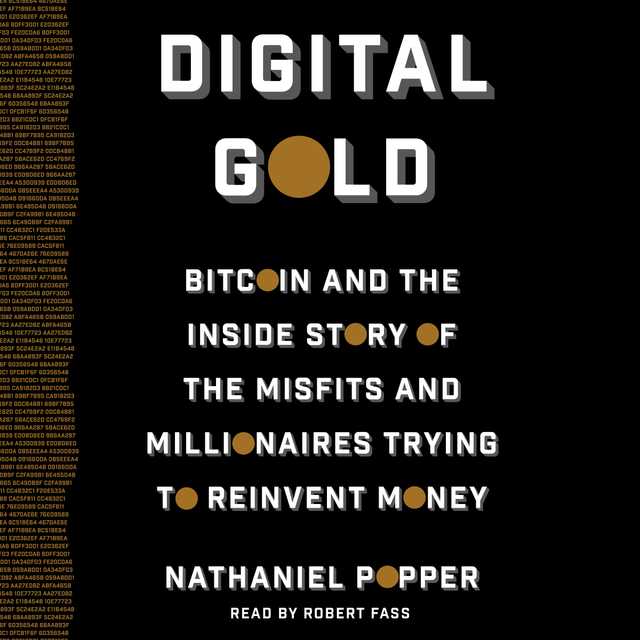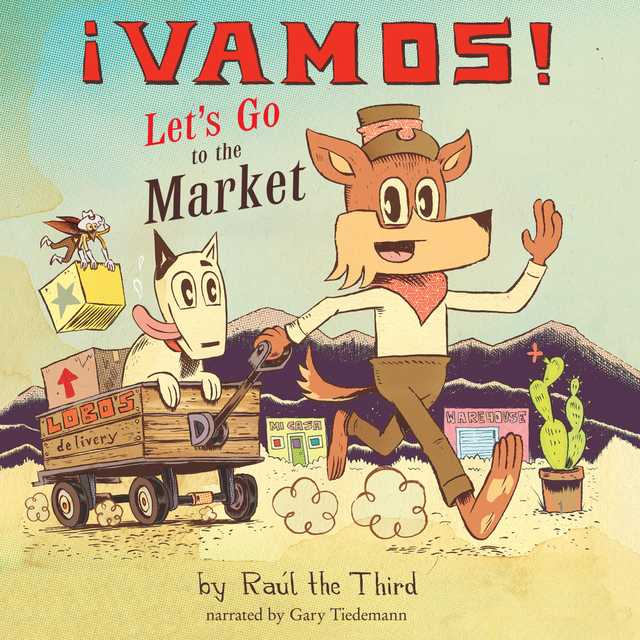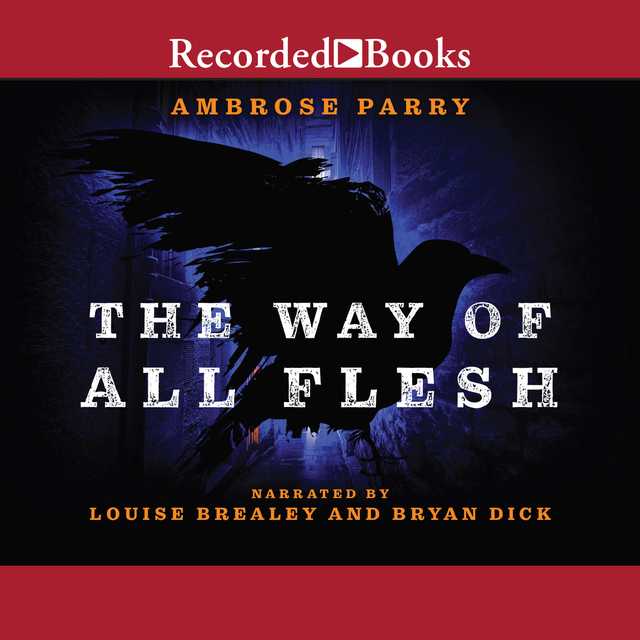Digital Gold Audiobook Summary
New York Times Book Review Editor’s Choice
SHORTLISTED FOR THE 2015 FINANCIAL TIMES AND MCKINSEY BUSINESS BOOK OF THE YEAR
A New York Times technology and business reporter charts the dramatic rise of Bitcoin and the fascinating personalities who are striving to create a new global money for the Internet age.
Digital Gold is New York Times reporter Nathaniel Popper’s brilliant and engrossing history of Bitcoin, the landmark digital money and financial technology that has spawned a global social movement.
The notion of a new currency, maintained by the computers of users around the world, has been the butt of many jokes, but that has not stopped it from growing into a technology worth billions of dollars, supported by the hordes of followers who have come to view it as the most important new idea since the creation of the Internet. Believers from Beijing to Buenos Aires see the potential for a financial system free from banks and governments. More than just a tech industry fad, Bitcoin has threatened to decentralize some of society’s most basic institutions.
An unusual tale of group invention, Digital Gold charts the rise of the Bitcoin technology through the eyes of the movement’s colorful central characters, including an Argentinian millionaire, a Chinese entrepreneur, Tyler and Cameron Winklevoss, and Bitcoin’s elusive creator, Satoshi Nakamoto. Already, Bitcoin has led to untold riches for some, and prison terms for others.
Other Top Audiobooks
Digital Gold Audiobook Narrator
Robert Fass is the narrator of Digital Gold audiobook that was written by Nathaniel Popper
Nathaniel Popper is a reporter at The New York Times. Before joining The Times, he worked at the Los Angeles Times and the Forward. Nathaniel grew up in Pittsburgh and is a graduate of Harvard College. He lives in Brooklyn with his family.
About the Author(s) of Digital Gold
Nathaniel Popper is the author of Digital Gold
More From the Same
- Publisher : HarperAudio
- Abraham
- American Gods [TV Tie-In]
- Dead Ringer
- House of Sand and Fog
- Prey
Digital Gold Full Details
| Narrator | Robert Fass |
| Length | 10 hours 49 minutes |
| Author | Nathaniel Popper |
| Category | |
| Publisher | HarperAudio |
| Release date | May 19, 2015 |
| ISBN | 9780062417961 |
Subjects
The publisher of the Digital Gold is HarperAudio. includes the following subjects: The BISAC Subject Code is Business & Economics, Corporate & Business History
Additional info
The publisher of the Digital Gold is HarperAudio. The imprint is HarperAudio. It is supplied by HarperAudio. The ISBN-13 is 9780062417961.
Global Availability
This book is only available in the United States.
Goodreads Reviews
Mal
April 06, 2017
If you’ve ever thought much about money, you may have wondered what gives it its value, especially if you’re aware that Richard Nixon took the dollar off the Gold Standard more than forty years ago. And if you’re at all involved in the world of finance and investment, you know perfectly well that very little money is tangible in any way: it’s almost all electrons, whizzing around the Internet at unspeakable speeds — and the ways in which we store and transfer money (bank accounts, credit and debit cards, checks, cash) are all notoriously vulnerable to loss, theft, and misappropriation. Wouldn’t it stand to reason in this age of the Internet that there should be a better, faster, more secure, and more reliable way to transact business?That’s the thinking that has led many venturesome individuals to create alternative currencies. Traditionally — and unsurprisingly — most of these alternative currencies have been paper-based. (Yes, there are dozens of them.) In recent times, though, especially since the advent of the Internet, innovative thinkers have been programming computers to create entirely new forms of money that are completely divorced from material reality. After all, there are just three fundamental functions that money must perform: “providing a medium of exchange, a unit for measuring the cost of goods, and an asset where value can be stored.” And none of these requires that money must be something you can hold in your hands.Enter Bitcoin, the best-known of a long line of software-based alternative currencies. Introduced in 2009 by someone using the name Satoshi Nakamoto (probably a pseudonym), Bitcoin has attracted more media attention than all the other alternative approaches combined. The early adopters of Bitcoins were self-styled libertarians who saw the new currency as a way to free society from the grip of government everywhere. However, Bitcoins didn’t rise to the attention of many others until one early adopter — an anarchist, really, despite what he might have called himself — set up a website for drug dealers and arms traffickers called Silk Road. The enormous traffic in Bitcoins created by Silk Road raised the level of activity manyfold and helped Bitcoin gain wider acceptance.Later, more mainstream investors and entrepreneurs became involved in the Bitcoin phenomenon, and government agencies inevitably took notice. “The unmistakable irony of these wild days,” writes Nathaniel Popper in Digital Gold, “was that a technology that had been designed, in no small part, to circumvent government power was now becoming largely driven by and dependent on the attitudes of government officials.” Not just in the United States, either. The Chinese government cast an even more jaundiced eye on Bitcoins than the U.S. government.As the word about Bitcoin spread through the financial marketplace, word leaked out that JPMorgan “began secretly working with the other major banks in the country . . . on a bold experimental effort to create [a system based on the technology behind Bitcoin] that would be jointly run by the computers of the largest banks and serve as the backbone for a new, instant payment system that might replace Visa, MasterCard, and wire transfers.” In other words, what began as a libertarian and anarchist effort to seize power from the hands of the Federal Reserve Bank, Wall Street, and the other arbiters of our financial lives might end up granting them even more power!“[T]he system was set up so that, like gold,” Popper explains, “Bitcoins would always be scarce — only 21 million of them would ever be released — and hard to counterfeit. . . With a hard cap on the number of Bitcoins, users could reasonably believe that Bitcoins would become harder to get over time and thus would go up in value.” In fact, though Bitcoins were worthless when first created, the going price at this writing is now $235, having topped out last year at nearly $1,200. The price of Bitcoins is volatile, to say the least.Just in case you’re thinking of taking a flyer and filling your piggy bank with Bitcoins, you might ponder its vulnerability. “Bitcoin itself is always one big hack away from total failure,” as Popper writes.On several occasions, hackers have raised questions about the security of the currency: the holes they uncovered have been plugged, but it’s anyone’s guess whether there’s more to be discovered.Digital Gold represents a thorough job of research. Its picture of the many strange characters who have played seminal roles in the development of Bitcoin is colorful — worth reading for its entertainment value alone. If you’re interested in finance and money, you’ll enjoy this book.
Marija
January 15, 2019
When innovation proves disruptive, money follows. This book is revealing how capital shapes the recognition of digital currency. Definitely a good read!
Atila
August 15, 2017
Uma ótima introdução à história da bitcoin. Popper dá uma timeline bem detalhada de 2008 a 2014, recapitulando um pouco das tentativas anteriores de criação de moedas, passando pelo artigo de Satoshi, os primeiros usuários de bitcoin e todo o processo de adoção dela. Em especial, gostei muito da descrição detalhada do livro para a criação e o declínio do Mt. Gox e do Silk Road. O ponto chato é que o livro termina em 2014, quando ainda se tinha uma visão mais parcial da falência do Mt. Gox, e fica com uma visão de mais incompetência do que má conduta – do que mais parece má conduta atualmente.Não tem como um livro sobre algo tão dinâmico não ficar desatualizado em bem pouco tempo, mas esse foco no começo das criptomoedas dá o maior espaço para algo que não muda tanto e continua interessante. O maior prejuízo do que fica de fora e é cada vez mais interessante saber são as altcoins, mas o livro que estou lendo em seguida The Age of Cryptocurrency: How Bitcoin and Digital Money Are Challenging the Global Economic Order cobre isso muito bem.
George
October 01, 2017
"Digital Gold" by Nathaniel Popper is a excellent introduction to the development of Bitcoin and digital currencies up to the year 2015. And it is a fun story to read with a number of interesting people. This book would make a great movie! I recommend this book to anyone who would like a good introduction to Bitcoin. Rating: 4 out of 5 stars Notes: Audiobook: Narrated by: Robert Fass Length: 10 hours and 49 minutes Unabridged Audiobook Release Date: 2015-05-19 Publisher: HarperAudio
Katie/Doing Dewey
May 25, 2015
If you’re like me before reading this book, you’ve heard of the digital money called Bitcoin only when it’s gotten negative press. Honestly, after hearing about many people losing the money they’d invested in Bitcoins, I thought this experiment was dead. I was still fascinated to learn about it though and especially about the people behind Bitcoin. As the subtitle indicates, this group included a wide variety of people, from millionaires to social revolutionaries, from hackers to drug dealers. Like most narrative nonfiction I love, it was the way the author told these people’s stories that made this a great read for me.The author had interviewed many of the people involved in the creation of Bitcoin. This meant that he was able to share direct quotes and snippets of their personal communication. I felt that he also presented the many different views on Bitcoin and its possible uses in an unbiased way. I particularly loved the variety of people involved in Bitcoin. Learning about them meant learning about many different subcultures and careers that I previously knew nothing about. I was also impressed by the way the author explained the technology behind Bitcoin. Within the text, he presented the fewest technical details necessary for the story to make sense. These bits were all explained very clearly and referred readers to the appendix for more, equally well explained, technical information.For those of you who are curious, it turns out that not only is Bitcoin alive and well, Bitcoins are currently accepted by a number of retailers. The Bitcoin currency has two main advantages: Bitcoins can be transferred anonymously and they don’t need to go through banks, making even international money transfers fast and free. After reading Digital Gold, I see a few downsides to the currency as well. First, like every other currency, the wealthy are likely to gain wealth the fastest. Many wealthy individuals were the first investors in Bitcoin, concentrating the wealth in a few hands, and today, special hardware is required to earn new bitcoins. Secondly, the mining (computational work done to create new Bitcoins) has been made artificially more difficult to limit the rate at which Bitcoins are created. This means a lot of electricity and computing power that could be used to do useful scientific work are being wasted. Personally, I don’t want to support that and will probably never invest in Bitcoins, but whatever your stance on the currency, it’s origin story is an interesting one.This review first published at Doing Dewey.
Maru
November 06, 2018
A great book for understanding the history of bitcoin, technical aspects and the history of its development.It helps one appreciate why the currency is so popular in countries with experience of populist politicians undermining the stability of a country's currency with their insane political or economic ideas, such as Argentina, Ukraine and the UK (from March 2019).However, as far as I recall, even this book didn't talk too much about what might well be an important limiting factor - electricity consumption of the blockchain technology:Energy cost of 'mining' bitcoin more than twice that of copper or gold: New research reveals that cryptocurrencies require far more electricity per-dollar than it takes to mine most real metals. Includes a link to the paper.Also, a video on the block chain data structure and bitcoin from what is probably the best maths channel on YouTube 3Blue1Brown: Ever wonder how Bitcoin (and other cryptocurrencies) actually work?
Austin Larson
July 31, 2015
Interesting piece of contemporary history tracing the development of Bitcoin. Engagingly written with detailed biographical information on important figures that have impacted Bitcoin in the past six years. Tells the story of the libertarian idealogues that created Bitcoin and then how it has developed wider acceptance but has simultaneously lost some of its allure to the libertarian movement as the financial system and the government have begun to force it to adapt to their precepts.
Tim
September 05, 2021
Fantastic writing and a compelling story that just doesn't seem real. Who's writing the movie script on this? There's some incredible documentaries but nothing "movie epic" in scale as of yet. Maybe that's because we're sitting right on the edge of what feels like a tipping point, a rather critical moment if Bitcoin and the broader crypto space will start to become adopted in a mainstream fashion. In many ways it does seem inevitable not even from knowing anything at all about the industry but simply by studying the charts and seeing how many times it's proved it's resilience over the past 13 years. Yet the entire financial industry is propped up on mutant forms of the loans, debt obligations, options, etc that crashed it in 2008. Seems like a super sized version is coming next which of course is what inspired Bitcoin's creation in the first place. But it's never been tested in a broader macro crash. Undoubtedly it will crash along with everything else initially, much like March of 2020. The question is: how will it recover? Will it recover? Will enough people actually adopt it and start to ascribe value to it? Value is only what society claims it is so that more than anything is the tipping point. So much of our lives has moved completely online over the past 25 years, are we as a society ready for our money to move there free and clear as well? There seems to be vastly different answers depending on demographics with age being one of the biggest determining indicators - the younger a person is the more likely they're comfortable with crypto. What does that tell us? Bitcoin was described as a mixture of "chaos, community, snake oil, innovation, high-mindedness, and enthusiasm" (94) The tech is amazing, the story is incredible, investing in it is highly risky, it could change the world, it could also go to zero but now it's led to development of technologies far past what Bitcoin developers even dreamt of so in that sense it always survives. Token issuance in gaming for example has been around for a long time, monetizing that is simple business sense. Same in regards to forms of digital ownership, copyrights, art, etc... this is all just future tech. Individual investments will thrive or fail but gaining a grasp on where tech is heading is to me what I'm diving into both as a personal fascination and investment potential. The story of web 3 gets started here.
David
May 27, 2017
Digital Gold does two things very well - it explains how Bitcoin works and it does so in entertaining fashion. I particularly liked the technical appendix the author referenced throughout the book.Popper begins with the earlier iterations of digital currency and takes us through the origins of Bitcoin. The Bitcoin pioneers were tech savvy idealists and interesting characters. Things get a little less interesting when the who's who of Silicon Valley elbow their way into the Bitcoin arena when it starts to become clear that this is technology with considerable promise. (This isn't a failing of the author, I'm just tired of the uber wealthy leveraging their vast resources to perpetuate their financial advantage. One of the early ideals of Bitcoin was that it could be a currency for the poor but that just seems completely unrealistic to me at this point in time.)(I believe in capitalism, I just wish it could be a little less extreme sometimes.)I saw an article recently that said a $100 investment in Bitcoins in 2010 would be worth about $75 million in late May 2017. I just googled the price of one Bitcoin and see that it's $2,046.86 USD. The price was close to $2,500 the day before. Who knows where it'll be in a year or 10 years.I think you have to be at least a little bit interested in Bitcoin and the workings of digital currency to enjoy this book but that's a pretty low bar to clear.
Charlene
June 10, 2016
This book reminded me a lot of Hatching Twitter, which I loved. What a story! Mystery, murder, intrigue, and cooperation v Machiavellian strategy as each person associated with Bitcoin did their part to try to create a new global currency. What more could you want?It is always the case that when new innovations come about, some people with less than good intentions will exploit the innovations to their advantage. I guess the trick is figuring out how to minimize that risk. I am sure we will figure it out in the future, but Bitcoin was one hell of an attempt to change the way things work. Loved it.
Brian
January 03, 2016
Extremely entertaining history of the digital currency Bitcoin. The author does an exceptional job of showing the motivations and history of the people involved in Bitcoin's creation and attempts to make it mainstream. The technological aspects of the currency (commodity?) were not as easy to understand from the book and I had to research the specifics on my own to feel like I had a grasp of the basics. All the same, the subject matter alone is worthy of 5 stars. Highly recommended.
Manoj
January 06, 2017
Brilliantly engrossing account of the worlds most famous cryptocurrency - Bitcoin.By all means, a great book - starts right from how bitcoin came into being and goes through both the professional and personal lives of people associated the bitcoin community who helped bitcoin grow in value (and in some cases, crash).Popper's writing is top notch and a joy to read. He writes about the technological intricacies of bitcoin in such spectacular fashion. I particularly liked the parts about the (in)famous Silk Road and how it paved way for the rise in popularity of Bitcoin. (Fun Fact: FBI is now the largest holder of bitcoin after seizing everything from Silk Road)I would highly recommend this book to anyone who is interested in Bitcoin.Oh chuck that, I would highly recommend this to anyone who has even a remote interest in today's technology - because trust me, Bitcoin is going to be big, beyond your wildest imagination.
Most Popular Audiobooks
Frequently asked questions
Listening to audiobooks not only easy, it is also very convenient. You can listen to audiobooks on almost every device. From your laptop to your smart phone or even a smart speaker like Apple HomePod or even Alexa. Here’s how you can get started listening to audiobooks.
- 1. Download your favorite audiobook app such as Speechify.
- 2. Sign up for an account.
- 3. Browse the library for the best audiobooks and select the first one for free
- 4. Download the audiobook file to your device
- 5. Open the Speechify audiobook app and select the audiobook you want to listen to.
- 6. Adjust the playback speed and other settings to your preference.
- 7. Press play and enjoy!
While you can listen to the bestsellers on almost any device, and preferences may vary, generally smart phones are offer the most convenience factor. You could be working out, grocery shopping, or even watching your dog in the dog park on a Saturday morning.
However, most audiobook apps work across multiple devices so you can pick up that riveting new Stephen King book you started at the dog park, back on your laptop when you get back home.
Speechify is one of the best apps for audiobooks. The pricing structure is the most competitive in the market and the app is easy to use. It features the best sellers and award winning authors. Listen to your favorite books or discover new ones and listen to real voice actors read to you. Getting started is easy, the first book is free.
Research showcasing the brain health benefits of reading on a regular basis is wide-ranging and undeniable. However, research comparing the benefits of reading vs listening is much more sparse. According to professor of psychology and author Dr. Kristen Willeumier, though, there is good reason to believe that the reading experience provided by audiobooks offers many of the same brain benefits as reading a physical book.
Audiobooks are recordings of books that are read aloud by a professional voice actor. The recordings are typically available for purchase and download in digital formats such as MP3, WMA, or AAC. They can also be streamed from online services like Speechify, Audible, AppleBooks, or Spotify.
You simply download the app onto your smart phone, create your account, and in Speechify, you can choose your first book, from our vast library of best-sellers and classics, to read for free.
Audiobooks, like real books can add up over time. Here’s where you can listen to audiobooks for free. Speechify let’s you read your first best seller for free. Apart from that, we have a vast selection of free audiobooks that you can enjoy. Get the same rich experience no matter if the book was free or not.
It depends. Yes, there are free audiobooks and paid audiobooks. Speechify offers a blend of both!
It varies. The easiest way depends on a few things. The app and service you use, which device, and platform. Speechify is the easiest way to listen to audiobooks. Downloading the app is quick. It is not a large app and does not eat up space on your iPhone or Android device.
Listening to audiobooks on your smart phone, with Speechify, is the easiest way to listen to audiobooks.











![Ganymede [Dramatized Adaptation]](https://speechify.com/audiobooks/wp-content/uploads/sites/29/2023/06/pr_eaudio_9781648814082_640px.jpg)


















